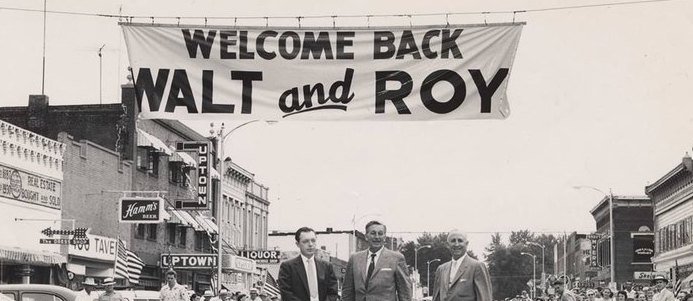
CASE STUDY
Walt Disney Hometown Museum Digital Archive Solution
Last year, Backlog was thrilled to connect with the Walt Disney Hometown Museum in Marceline, Missouri, where Walt Disney lived with his family in his early childhood. Founded in 2001, the museum is located in a restored Santa Fe Railway Depot, and its holdings have grown from its origins as the personal collection of Ruth Disney Beecher, Walt’s sister. It houses family letters, photos, and other artifacts that present the history of Walt Disney’s life in Marceline, along with representations of the town reflected in his work.
Emma Prince, Backlog’s founder, at the Walt Disney Hometown Museum.
Goals: Standardization and Improving Accessibility
When the Walt Disney Hometown Museum (WDHM) contacted Backlog, it expressed interest in learning how to make its collections more accessible to the public, especially those who cannot travel to Marceline in person. In addition to the items on display in the museum, the WDHM has archival materials, many of which are currently stored in boxes, inaccessible and under-utilized. What steps could the museum take not only to ensure these items were properly archived but also to make them available to a larger audience?
To begin to answer these questions, Backlog spent time on-site with WDHM staff to learn about what they saw as their current strengths and challenges. We listened to what they hoped to gain by standardizing policies and procedures and heard their vision for improved online accessibility. We developed a set of policies and procedures; outlined how to take a physical item, scan it, and display it online; and created a web platform to make digital exhibits possible. In short, Backlog worked with WDHM to develop a framework to help get items out of boxes and into an online digital archive.
Solution: Policies and Procedures
By creating archival policies and procedures, Backlog helps organizations develop professional-level, standardized workflows for staff and volunteers alike. While organizations’ needs may differ, a standard list of policies and procedures we can create includes:
Accession Policy and Procedure
Collection Development Policy
Collection Use Policy
Deaccession Policy
Deaccession/Destruction Form
Deed of Gift
Donation Log
Loan Agreement
Permission to Publish
Processing Manual
Research Registration Form
For the Walt Disney Hometown Museum, Backlog created policies and procedures tailored to meet the museum’s specific needs and goals. For instance, we provided a Collection Development Policy to ensure that all collections-related activities meet professional standards for the preservation and care of historical materials. This document also outlines active collecting areas and criteria for acquisition to clarify the types of new materials WDHM will and will not accept. In addition, since many of the items accessioned by the museum are donations, we took care to create a Deed of Gift form to ensure mutual understanding of terms between future donors and the museum. And, because one of WDHM’s objectives is improving access to its archival collections, it was important to create a Processing Manual that can guide staff and volunteers in physically arranging and describing existing materials so that, ultimately, these items can be scanned for inclusion in a digital archive.
With policies and procedures in place, Backlog next began to work with the Walt Disney Hometown Museum on a Digital Archive Solution.
Solution: Digital Archive
With its Digital Archive Solution, the Backlog team provides organizations with the tools they need to set up and maintain a digital archive. We’ll develop a manual to help streamline the digitization process. We’ll work with you to choose an archival database that is accessible to your organization’s volunteers and community. And we’ll set up the database, migrate any existing data to the new system, and provide ongoing technical support and volunteer training.
Here’s what the Digital Archive Solution looked like for the Walt Disney Hometown Museum.
Digitization Manual
Backlog developed a Digitization Manual to ensure WDHM personnel have all the information they need about the digitization process. Like all of our services, the digitization manual is tailored to meet the client’s unique needs and operating capacity. It includes instructions specific to WDHM’s scanning equipment–we can also suggest equipment!–and it’s written with both experienced staff and volunteers in mind. It covers how, and when, to create both preservation-quality and public access digital files; how to keep a record of items that have been digitized; and how to use standard Dublin Core terms to create metadata–data about information resources–when describing archival materials.
Digitizing Ruth Disney’s childhood scrapbook.
Once materials are digitized, they can be displayed in an online digital archive like the one Backlog developed for WDHM.
Digital Archive with Omeka
To make materials from the WDHM more accessible to the wider public, Backlog created an online digital archive using Omeka, a cloud-based web-publishing platform for archives. Omeka can be used to display digital collections, create searchable content, and feature materials in online exhibits. Backlog sets up and maintains the Omeka software on a fully managed and secure AWS (Amazon Web Services) instance. Going forward, we will provide ongoing support, taking care of upgrades, customizations, and troubleshooting. We also have a fully automated backup system, monitoring, and innovative cloud-native architecture to ensure data cannot be lost.
For WDHM, Backlog customized the site with the museum’s colors and logo to mirror their website and other materials. Check out the Walt Disney Hometown Museum Online Archive here. As digitization progresses, WDHM will continue to migrate items to the site and showcase more and more materials from its incredible archive, like the Ruth Disney Collection.



